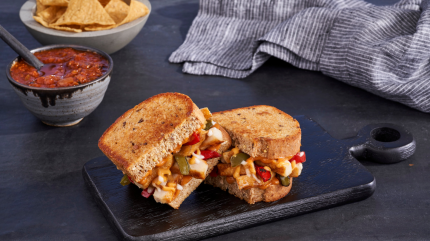
Nestlé is set to launch a range of meals in the US designed as a “companion” for those taking GLP-1 weight-loss medication.
The Swiss giant said the Vital Pursuit products are “high in protein, a good source of fibre, contain essential nutrients and … are portion-aligned to a weight loss medication user’s appetite”.

Discover B2B Marketing That Performs
Combine business intelligence and editorial excellence to reach engaged professionals across 36 leading media platforms.
Nestlé said the range of 12 SKUs will include frozen meals such as bowls with whole grains or protein pasta, sandwich melts and pizzas, all for a suggested retail price of $4.99 and under.
The group said it is “continuing to explore opportunities to expand choices across its portfolio and deliver on consumer eating habits”.
Steve Presley, the CEO of Nestlé’s North America business, said: “At Nestlé we want to be there for every moment in our consumers’ lives – today and in the future. As the use of medications to support weight loss continues to rise, we see an opportunity to serve those consumers. Vital Pursuit provides accessible, great-tasting food options that support the needs of consumers in this emerging category.
“We’re leveraging our deep understanding of consumers and nutritional science to stay ahead of the trends that are shaping consumer behaviors, and innovating across our portfolio to deliver products people will love.”

US Tariffs are shifting - will you react or anticipate?
Don’t let policy changes catch you off guard. Stay proactive with real-time data and expert analysis.
By GlobalDataVital Pursuit products will be available in the fourth quarter of the year across the US, Nestlé revealed.
“We know that every consumer on a health journey has individualised needs and considerations, and having options to support those needs will continue to play an important role,” Tom Moe, president of Nestlé’s US meals division, added.
“Over the past several years, we have been expanding choices across our meals portfolio to address consumer eating habits, and as the market evolves, we’ll continue to expand Vital Pursuit with more product formats for our consumers.”
Glucagon-like peptide 1 (GLP-1) refers to a group of anti-obesity drugs that are typically injected – although pill-based medicines are increasingly coming to market.
Leading brands include Danish pharmaceutical company Novo Nordisk’s Ozempic and Negovy. Ozempic was first approved by the US Food and Drug Administration for the treatment of Type-2 diabetes at the end of 2017.
JP Morgan research predicts that total GLP-1 users in the US may reach 30 million by 2030 – or around 9% of the population. About nine million US citizens were taking a GLP-1 drug as of the end of 2022, Trilliant Health analysis found.
In October last year, when Nestlé reported its third-quarter sales, the company’s management faced questions from analysts about the impact the use of GLP-1 drugs could have on the business.
At the time, Nestlé CEO Mark Schneider played down the impact on sales from the emergence of appetite-suppressing GLP-1 drugs in the US, instead focusing on the innovation opportunities.
“Please note that while these drugs offer new therapy options for these patients, for patients with type-2 diabetes, they are not a permanent solution and are no replacement for an appropriate diet, coupled with the right amount of exercise,” Schneider said.
“For the time that patients spend on these drugs and after, we are already developing a number of companion products. The goal will be to address the risk of malnutrition and the loss of lean muscle mass while on the GLP-1 therapy and to avoid or limit weight rebound after the therapy.”





